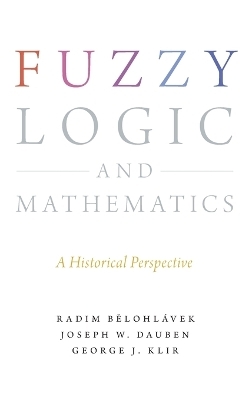
Fuzzy Logic and Mathematics
Oxford University Press Inc (Verlag)
978-0-19-020001-5 (ISBN)
The term "fuzzy logic" (FL), as it is understood in this book, stands for all aspects of representing and manipulating knowledge based on the rejection of the most fundamental principle of classical logic: the principle of bivalence. According to this principle, each declarative sentence is required to be either true or false. In fuzzy logic, these classical truth values are not abandoned. However, additional, intermediary truth values between true and false are allowed, which are interpreted as degrees of truth. This opens a new way of thinking--thinking in terms of degrees rather than absolutes. For example, it led to the definition of a new category of sets, referred to as fuzzy sets, in which membership is a matter of degree.
The book examines the genesis and development of fuzzy logic. It surveys the prehistory of fuzzy logic and inspects circumstances that eventually lead to the emergence of fuzzy logic. The book explores in detail the development of propositional, predicate, and other calculi that admit degrees of truth, which are known as fuzzy logic in the narrow sense. Fuzzy logic in the broad sense, whose primary aim is to utilize degrees of truth for emulating common-sense human reasoning in natural language, is scrutinized as well. The book also examines principles for developing mathematics based on fuzzy logic and provides overviews of areas in which this has been done most effectively. It also presents a detailed survey of established and prospective applications of fuzzy logic in various areas of human affairs, and provides an assessment of the significance of fuzzy logic as a new paradigm.
Radim Belohlávek is Professor of Computer Science and Head of Department of Computer Science at the Palacky University, Olomouc in the Czech Republic. He obtained PhD in Computer Science, PhD in Mathematics, and DSc in Mathematical and Physical Sciences. He is the author of over 150 papers in peer reviewed journals and conferences on various aspects of uncertainty, logic, and discrete mathematics. Joseph W. Dauben is Distinguished Professor of History and the History of Science at the City University of New York. A graduate of Claremont McKenna College (A.B. '66) and Harvard University (A.M., Ph.D. '72), Professor Dauben is the author of biographies of Georg Cantor and Abraham Robinson. He has been a member of the Institute for Advanced Study (Princeton) and Clare Hall (Cambridge), and the recipient of a Guggenheim Fellowship and a Senior ACLS Fellowship. In January of 2012 he received the Albert Leon Whiteman Memorial Prize for History of Mathematics, conferred by the American Mathematical Society in recognition of a career of outstanding contributions to the history of mathematics. George J. Klir spent most of his academic career (1969-2008) with the State University of New York at Binghamton where he was appointed Distinguished Professor of Systems Science in 1978. He published well over 300 research papers and 31 scholarly books. He received numerous awards and honors including 6 honorary doctoral degrees.
Preface
Notes for the Reader
1. Aims and Scope of This Book
2. Prehistory, Emergence, and Evolution of Fuzzy Logic
3. Fuzzy Logic in the Broad Sense
4. Fuzzy Logic in the Narrow Sense
5. Mathematics Based on Fuzzy Logic
6. Applications of Fuzzy Logic
7. Significance of Fuzzy Logic
Appendices
A. The Enigma of Cox's Proof
B. Overview of Classical Logic
C. Photographs
Glossary of Symbols
References
| Erscheinungsdatum | 13.05.2017 |
|---|---|
| Verlagsort | New York |
| Sprache | englisch |
| Maße | 239 x 163 mm |
| Gewicht | 834 g |
| Themenwelt | Geisteswissenschaften ► Philosophie ► Logik |
| Mathematik / Informatik ► Mathematik ► Geschichte der Mathematik | |
| Mathematik / Informatik ► Mathematik ► Logik / Mengenlehre | |
| ISBN-10 | 0-19-020001-4 / 0190200014 |
| ISBN-13 | 978-0-19-020001-5 / 9780190200015 |
| Zustand | Neuware |
| Haben Sie eine Frage zum Produkt? |
aus dem Bereich


